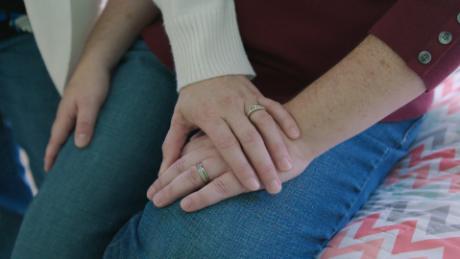
issued a waiver in January that lets federally funded child welfare agencies in the state refuse to perform services that conflict with their religious values.
As a result of the waiver, Eden Rogers and Brandy Welch say, the state enabled a faith-based agency to turn them away when they tried to become foster parents in April.
conscience protections” in health care and other arenas. Opponents call it state-sponsored discrimination that targets non-Christians and the LGBTQ community. The administration says the measures are necessary to let faith-based organizations operate without compromising their beliefs.
The South Carolina couple’s lawsuit seeks to rescind the waiver. It also asks for a permanent injunction that would prevent the state from contracting with or licensing agencies that discriminate against prospective foster parents based on their religion, sex, sexual orientation or marital status as same-sex couples.
“Faith is a part of our family life, so it is hurtful and insulting to us that Miracle Hill’s religious view of what a family must look like deprives foster children of a nurturing, supportive home,” Brandy Welch said in a statement issued by the American Civil Liberties Union, which represents the couple along with Lambda Legal and the South Carolina Equality Coalition Inc.
The lawsuit names as defendants HHS and its Administration for Children and Families division, which issued the waiver; Gov. Henry McMaster, who requested the waiver; and the state Department of Social Services.
The South Carolina Department of Social Services declined to comment on the pending litigation, and McMaster’s office did not immediately respond to a request for comment. HHS pointed CNN to a statement from January, when it issued the waiver.
In the statement, Lynn Johnson, assistant secretary for HHS’ Administration for Children and Families, cited the need for more families in the foster care system as a reason the agency had granted the state’s request.
“This decision preserves all of the foster care agencies currently available for children in South Carolina by ensuring faith-based organizations can continue to serve this vulnerable population. It protects minors who are in need of as many options as possible for being placed in loving foster families.”
The couple’s lawsuit charges that the waiver achieves the opposite by excluding prospective parents when demand exceeds supply. Civil rights organizations and child welfare advocacy groups share the position that religious exemptions harm children in foster care by limiting the pool of prospective parents.
report by the online publication The Chronicle of Social Change that suggest the number of children in foster care in South Carolina grew by 26% from 2012 to 2017,
while the number of available foster homes decreased.
“Defendants’ actions have created a public child welfare system in South Carolina, funded by taxpayer dollars, in which the suitability of prospective foster parents is assessed based on religious requirements,” the lawsuit claims.
lawsuit in Michigan, by contrast, challenges that state’s policy of refusing to contract with child welfare agencies that refuse to perform services that conflict with their religious beliefs.

